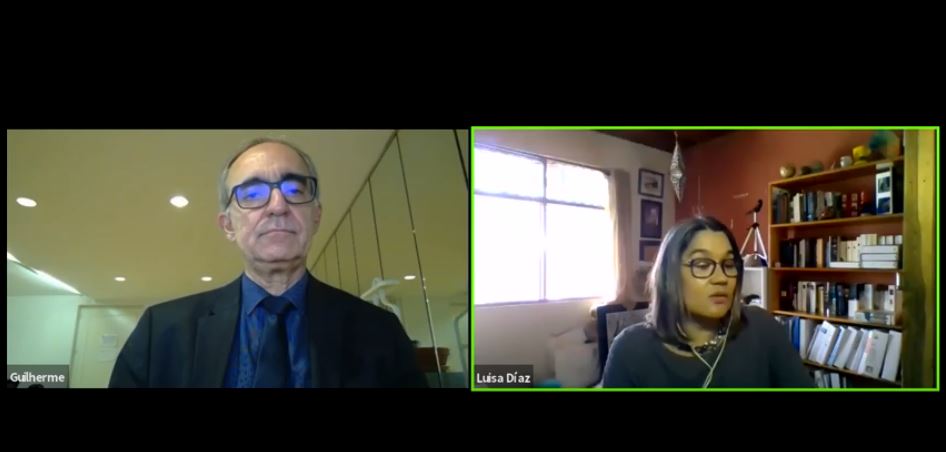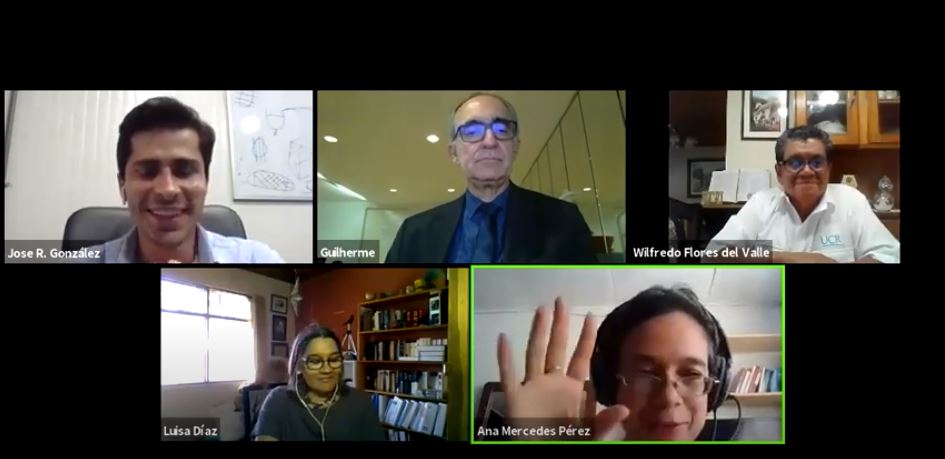Food safety: a fundamental aspect of public policies
On June 8, the Ministry of Economy, Industry and Commerce (MEIC) of Costa Rica, with the technical collaboration of the Inter-American Institute for Cooperation on Agriculture (IICA) held the web seminar "Sustainable Production and its Relation to Food Safety". The webinar was also attended by the Chairperson of the Codex Alimentarius Commission, Guilherme da Costa Jr and by several panellists representing different institutions and entities of the public and private sector.

Guilherme da Costa and Luìsa Dìaz
The Minister of Economy, Industry and Trade, Victoria Hernández Mora, offered words of welcome in which she celebrated the second World Food Safety Day - a proposal that had been promoted by the Government of Costa Rica - emphasizing the importance of food safety as a fundamental aspect of public policies and stressed that this day was a good opportunity to raise awareness among all actors in the food chain, from farm to fork, as safety requires an integrated and participatory approach. In this celebration influenced by the coronavirus disease pandemic (COVID-19), The Minister stressed that while COVID-19 was not transmitted by food, there was a need to put more emphasis on food safety, and to contribute to the objectives of the Codex Alimentarius Commission and of the UN Sustainable Development Goals.
Safe food: a value for everyone
The seminar was further divided into two parts. In the first part, the panellists addressed various aspects related to the agoindustrial production, highlighting the importance of risk management activities; the link between climate and food and how this impacts on food safety and food security; and the role of standards as a tool for organizations working in the food sector, to contribute to the sustainable development and to improve the quality of life of the people.

Discussion panel online
The second part dealt with issues that directly affected food safety, e.g. packaging that can be recycled and composted; treatments to eliminate pathogenic microorganisms in the processing of fruit and vegetable juices; COVID-19 and food safety and the need to reduce the risk factors not only posed by COVID-19, but also to prevent other types of disease; the need to apply good agricultural and manufacturing practices to cocoa and chocolate processing; and how biotechnology could contribute to improving the characteristics and increasing the nutritional value of food and prevent the development of pathogens, further promoting food safety.
At the heart of the Codex mandate are the core values of collaboration, inclusiveness, consensus building and transparency. Governmental and non-governmental, public and private organizations alike play a vital role in ensuring Codex texts are of the highest quality and based on sound science.
Codex would have little authority in the field of international standard setting if it did not welcome and acknowledge the valuable contributions made by observers. Expert technical bodies, industry and consumer associations
contribute to the standard-setting process in a spirit of openness, collaboration and transparency.
Intergovernmental organizations (IGOs) and international non-governmental organizations (NGOs) can apply for observer status in Codex in order to attend and put forward their views at every stage of the standard-setting process.
 Current Codex Alimentarius Commission
Current Codex Alimentarius Commission
Food safety: a fundamental aspect of public policies
On June 8, the Ministry of Economy, Industry and Commerce (MEIC) of Costa Rica, with the technical collaboration of the Inter-American Institute for Cooperation on Agriculture (IICA) held the web seminar "Sustainable Production and its Relation to Food Safety". The webinar was also attended by the Chairperson of the Codex Alimentarius Commission, Guilherme da Costa Jr and by several panellists representing different institutions and entities of the public and private sector.

Guilherme da Costa and Luìsa Dìaz
The Minister of Economy, Industry and Trade, Victoria Hernández Mora, offered words of welcome in which she celebrated the second World Food Safety Day - a proposal that had been promoted by the Government of Costa Rica - emphasizing the importance of food safety as a fundamental aspect of public policies and stressed that this day was a good opportunity to raise awareness among all actors in the food chain, from farm to fork, as safety requires an integrated and participatory approach. In this celebration influenced by the coronavirus disease pandemic (COVID-19), The Minister stressed that while COVID-19 was not transmitted by food, there was a need to put more emphasis on food safety, and to contribute to the objectives of the Codex Alimentarius Commission and of the UN Sustainable Development Goals.
Safe food: a value for everyone
The seminar was further divided into two parts. In the first part, the panellists addressed various aspects related to the agoindustrial production, highlighting the importance of risk management activities; the link between climate and food and how this impacts on food safety and food security; and the role of standards as a tool for organizations working in the food sector, to contribute to the sustainable development and to improve the quality of life of the people.

Discussion panel online
The second part dealt with issues that directly affected food safety, e.g. packaging that can be recycled and composted; treatments to eliminate pathogenic microorganisms in the processing of fruit and vegetable juices; COVID-19 and food safety and the need to reduce the risk factors not only posed by COVID-19, but also to prevent other types of disease; the need to apply good agricultural and manufacturing practices to cocoa and chocolate processing; and how biotechnology could contribute to improving the characteristics and increasing the nutritional value of food and prevent the development of pathogens, further promoting food safety.
 Codex and Observer
Codex and Observer
around the world since ancient times.
We might not always know where it comes from,
but we expect it to be available, safe and of good quality.









Leave a comment